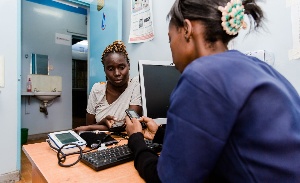Africa News of Thursday, 15 May 2025
Source: www.ghanawebbers.com
Kenya: Billions Cut as Health Ministry Warns of Derailed Universal Health Plan, Stalled Reforms
Nairobi — The Universal Health Coverage plan faces a crisis. The State Department for Public Health and Professional Standards has a budget cut of Sh38.7 billion. This threatens key health programs.
Health Principal Secretary Mary Muthoni Muriuki submitted documents to the National Assembly. The department requested Sh70 billion for the 2025/2026 financial year. Instead, it received only Sh31.3 billion, which is less than half of what was needed.
"This leaves a financing gap of Sh38.7 billion," Muriuki stated. This shortfall will undermine essential public health functions and priorities under the Bottom-Up Economic Transformation Agenda (BETA). High-priority programs like paying medical interns and equipping community health promoters are directly affected.
Interns' Deployment in Limbo
The deployment of medical interns is heavily impacted. The ministry needs Sh7.67 billion to deploy 5,449 interns by July 2025. However, it has only been allocated Sh4.02 billion, creating a gap of Sh3.65 billion.
"The ministry risks grounding the internship program without this funding," Muriuki warned. This would affect graduates transitioning into the workforce and service delivery in public hospitals.
Community Health Promoters Undermined
The government allocated Sh3.2 billion for stipends to over 107,000 Community Health Promoters (CHPs). However, there is no funding for administrative support or supervision. The department requested Sh150 million for monitoring and evaluation.
Without this funding, the program risks poor implementation. "This program is central to preventive healthcare," Muriuki noted.
Operational Funding Needed
The newly established State Department for Public Health has not received any operational funds yet. It requested Sh250 million to support basic administration and staff structure implementation.
"This is the department's first full budget cycle since establishment," said Muriuki. Without operational funding, its ability to coordinate health programs nationally will be limited.
Research and Vaccine Capacity at Risk
Vaccine self-sufficiency efforts have also suffered due to budget cuts. The Kenya Institute of Primate Research (KIPRE) plays a vital role in vaccine development but has received no funding.
The department seeks Sh500 million to support KIPRE's operations. Additionally, it requires Sh675 million to upgrade the National Quality Control Laboratory (NQCL) to meet WHO standards.
This upgrade is crucial for regulating local pharmaceutical manufacturing and ensuring quality medical products. Furthermore, the ministry requested Sh350 million for the National School Health and Nutrition Programme with counties but received no allocation yet.











